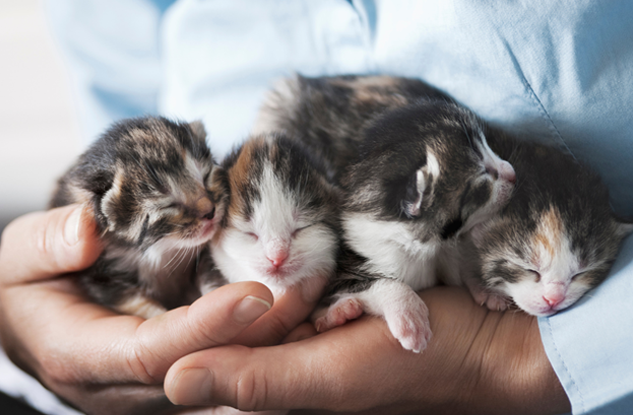
If you find an abandoned litter of kittens you might need to look after them for the next month as RSPCA NSW enacts a temporary hold. Photo: RSPCA NSW.
The Blue Mountains and Illawarra will be the only RSPCA Shelters in the state able to accept surrendered or stray cats for the next month.
A temporary hold is in place at all other sites for the next four weeks due to a nationwide supply shortage of core cat vaccinations.
The temporary measure is effective immediately to protect the wellbeing of cats already in the RSPCA’s care.
“Core feline vaccinations play a pivotal role in safeguarding cats from not only cat flu, but also the fatal feline panleukopenia virus,” RSPCA NSW Chief Veterinarian Dr Liz Arnott said.
“Although feline panleukopenia is rarely encountered in pet cats and flu symptoms are typically manageable, they are much more commonly seen in a shelter environment and can have dire consequences.”
“These illnesses can spread rapidly in a shelter, leading to large-scale mortality, which is a scenario we are committed to avoiding.”
The Blue Mountains and Illawarra shelters are the only ones staying open to accepting strays to keep in line with council pound obligations.
RSPCA NSW has vaccination protocols for every incoming cat, with the remaining vaccination stock to be used to complete vaccine regimes for felines already in its care, and to respond to any intake of cats through the inspectorate.
Dr Arnott has urged pet owners to ensure their cats are desexed from four months of age, as cat breeding activity will start ramping up with the warmer weather.
She also advised owners to start thinking about adapting to a safe-at-home lifestyle for their cats.
“In light of these vaccine shortages, the limited sheltering options and the upcoming kitten season, it’s never been more crucial for people to educate themselves on adopting responsible cat ownership practices, as well as what to do if they find a cat or a litter of kittens,” Dr Arnott said.
“During kitten season, feline intake at RSPCA NSW increases by eight times, up to 500 kittens each week.
“Desexing is vitally important to prevent unwanted pregnancies and keeps your beloved feline friend healthy.”
RSPCA NSW advised that if you come across a cat in the community which appears to be healthy and uninjured, research shows it’s likely to be receiving food or care from people in the neighbourhood.
In these cases, there’s no immediate need to capture the cat and bring it to a shelter.
People have been encouraged to use social media or connect with neighbours to find out who may be looking after the cat so that the best plans can be made when the temporary hold on RSPCA NSW Shelters is lifted.
In the case of finding a litter of stray kittens, people can find advice on the RSPCA NSW website.
“While our shelters are currently unable to accommodate these kittens, we urge you to provide care for them for the next 4 – 6 weeks until RSPCA NSW has vaccinations in stock,” a spokesperson said.
“If you need guidance on caring for kittens, please contact your veterinarian or RSPCA NSW over the phone. ”
The organisation will be able to assist with litters once vaccinations are available.
You can also contact your local vet to see if they have vaccination availability for the kittens, as the RSPCA can consider accepting fully vaccinated kittens (with a final vaccine given at 12 weeks or older).
“During this period, you will need to continue caring for the kittens or find friends or family willing to do so. Please refrain from letting them outside if they have not been desexed, as kittens can begin breeding as early as four months of age,” a spokesperson said.
“We understand the concerns and challenges this unprecedented situation may pose, and we appreciate the community’s understanding and support during this critical period.”







